In this review, we will be comparing Q350 and Q150, two Passive Bookshelf speakers by KEF
Let's have a brief look at the main features
of KEF Q350 and KEF Q150 first before getting into our more
detailed comparison.
KEF Q350 Key Specs
- 2-way Design
- 11th Generation Uni-Q Driver
- 1" Dome Tweeter
- 6.5" Aluminum Woofer
- 63-28k Hz Frequency Response
- 87 dB Sensitivity
- Impedance: 8ohms
- Power Range:10-120watts
- Weight:7.60kg
- Dimensions (H x W x D): 358.0" x 8.2" x 12.0"( 358.0 x 210.0 x 306.0mm )
KEF Q150 Key Specs
- 2-way Design
- 11th Generation Uni-Q Driver
- 1" Dome Tweeter
- 5.25" Aluminum Woofer
- 51-28k Hz Frequency Response
- 86 dB Sensitivity
- Impedance: 8ohms
- Power Range:10-100watts
- Weight:5.60kg
- Dimensions (H x W x D): 303.0" x 7.0" x 10.9"( 303.0 x 180.0 x 278.0mm )
Q350 and Q150 are members of KEF's Q series of speakers. Below you can find the loudspeakers from this series.
What size room are the KEF Q350 and KEF Q150 speakers good for?
The size of the room in which you are planning to use these loudspeakers is an important decision
factor. Here we have compared their suitability to various sizes of environments considering their size
and max power parameters:
| Listening Environment* |
KEF Q350 |
KEF Q150 |
| Near-field |
Poor |
Average |
| Small Room |
Average |
Good |
| Mid-size Room |
Good |
Average |
| Large Room |
Average |
Poor |
| Very Large Room |
Poor |
Bad |
(* Approximate Room sizes: Small < 100sq. ft / 9 m2,
Mid-size: 100-220 sq. ft / 9-20 m2, Large 220-400 sq. ft / 20-36 m2, Very Large: >
400 sq. ft / 36 m2.
Average Floor Height: 9" / 2.7m. Typical room sizes differ from country to country, and the actual
listening experience changes depending on floor height, room shape, surface materials, listening
position, speaker locations, etc.)
In the following sections, we will get into more detail in order to better understand how the KEF Q350 and KEF Q150 compare and hopefully end up with enough arguments to decide which one of these loudspeakers is the better choice for you.
**This post contains affiliate links, and I will be compensated if you make a purchase after clicking
through my links. As an Amazon Associate I earn from qualifying purchases.
Drivers
Both Q350 and Q150 are 2-way speakers.
| Driver |
KEF Q350 |
KEF Q150 |
|
Driver Setup
|
2-way
|
2-way
|
|
Tweeter
|
1-inch
|
1-inch
|
|
Midrange
|
- |
- |
|
Woofer
|
1 x 6.5-inch
|
1 x 5.25-inch
|
Q350 features a 1" vented aluminum Dome Tweeter and 1 x 6.5" Aluminum Woofer with a Crossover frequency at 2500Hz. On the other hand, the Q150 features a 1" vented aluminum Dome Tweeter and 1 x 5.25" Aluminum Woofer with a Crossover frequency at 2500Hz.
Frequency Response
Q350 has a frequency range of 63-28k Hz whereas Q150 has a frequency range of 51-28k Hz. With a minimum frequency of 51Hz, the Q150 can go significantly deeper on the low side and provide stronger bass compared to the Q350's min frequency of 63Hz.
Below graphs depict how these two speakers compare with the max, min and average values of the Min and Max Frequencies of other speakers in the Bookshelf class in our database.
Low Frequency
Bookshelf Speakers
High Frequency
Bookshelf Speakers
None of these speakers achieves full range experience which is commonly agreed as 20Hz-20kHz. In order to achieve lower lows / deeper bass, we recommend you pair these with a subwoofer. Visit our Powered Subwoofers section to find out more about the available options.
Impedance and Sensitivity
Q350 and Q150 have the same Impedance of 8 ohms but where they differ is the sensitivity levels. Q350 sensitivity is rated at 87 dB and the Q150's is at 86 dB. This 1 dB difference makes the KEF Q350 a more sensitive speaker compared to KEF Q150, hence will play louder with the same amount of watts.
Sensitivity
Bookshelf Speakers
Power Range
Power
range is the range of input power in watts RMS that a loudspeaker is designed to handle. While using
an amplifier within this range ensures the nominal performance , inputting a power that is higher than the
max wattage can result in a damaged speaker.
Q350 can handle a max power of 120 watts RMS from the amp the whereas Q150 has a max power handling value of 100 watts RMS, 20 watts less than the Q350.
Keep in mind that a higher max power handling value doesn't necessarily make that a louder speaker
compared to a lower max handling speaker. Loudness or the sound level is also impacted by parameters
such as Impedance, sensitivity and system efficiencies.
Input Type and Bi-Amping / Bi-Wiring
Q350 features Post type posts and Q150 has a Post type posts. None of these speakers feature bi-amping/bi-wiring.
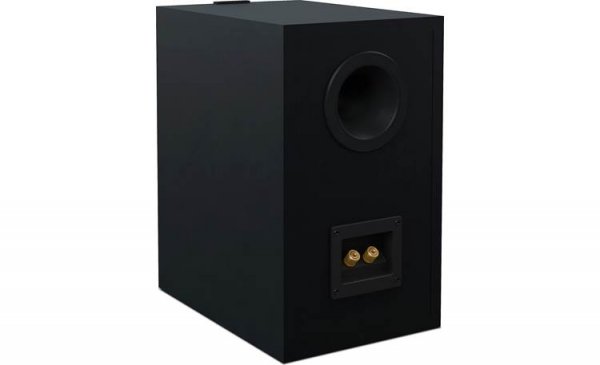 KEF Q350's Post terminals
KEF Q350's Post terminals
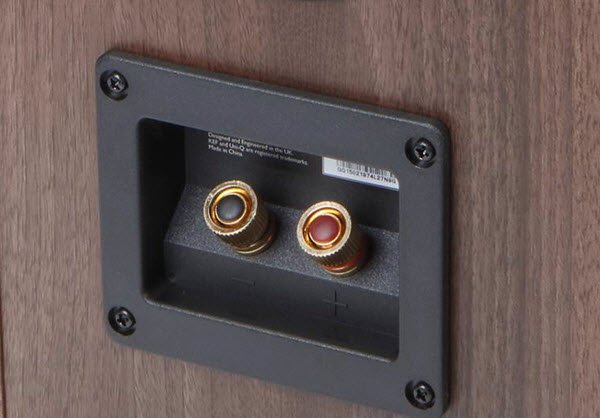 KEF Q150's Post terminals
KEF Q150's Post terminals
Cabinet Type and Port Position
Both Q350 and Q150 have rear firing ports. Rear ported speakers generally need more room between the backside of the speaker and the wall compared to sealed and front/bottom ported speakers. Placing the speakers too close to the walls may cause the bass to sound boomy.
If you are limited in space and can't get the speakers away from the backwall, check our Speakers with Front Firing Ports page.
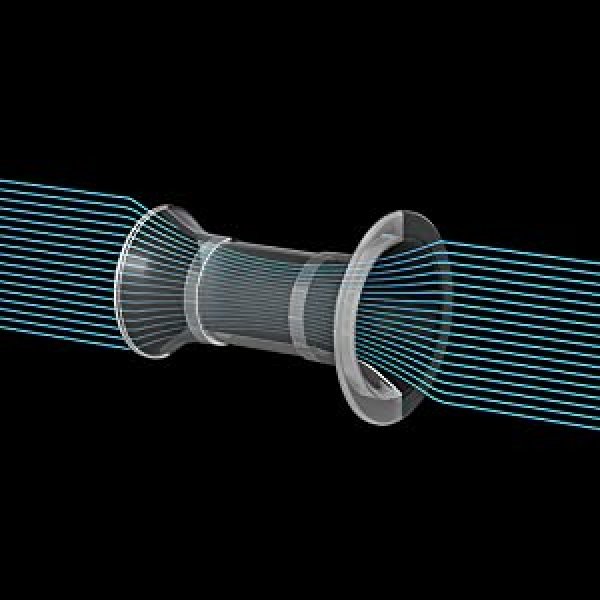 KEF Q150 Port
KEF Q150 Port
Physical Specs
Size of a speaker can sometimes become an important decision factor due to space constraints or in some cases purely for esthetic reasons. In this section, we are going to compare KEF Q350's and KEF Q150's external dimensions. KEF Q350 has external dimensions of 358.0 x 210.0 x 306.0mm ( 14.0 x 8.2 x 12.0inch) whereas KEF Q150 has external dimensions of 303.0 x 180.0 x 278.0mm ( 11.9 x 7.0 x 10.9inch) .
KEF Q350 is clearly the larger of the two speakers. Its body is 30mm wider, 55mm taller and 28mm deeper than KEF Q150.
Below you can see the front view size comparison of KEF Q350 and KEF Q150 in scale.
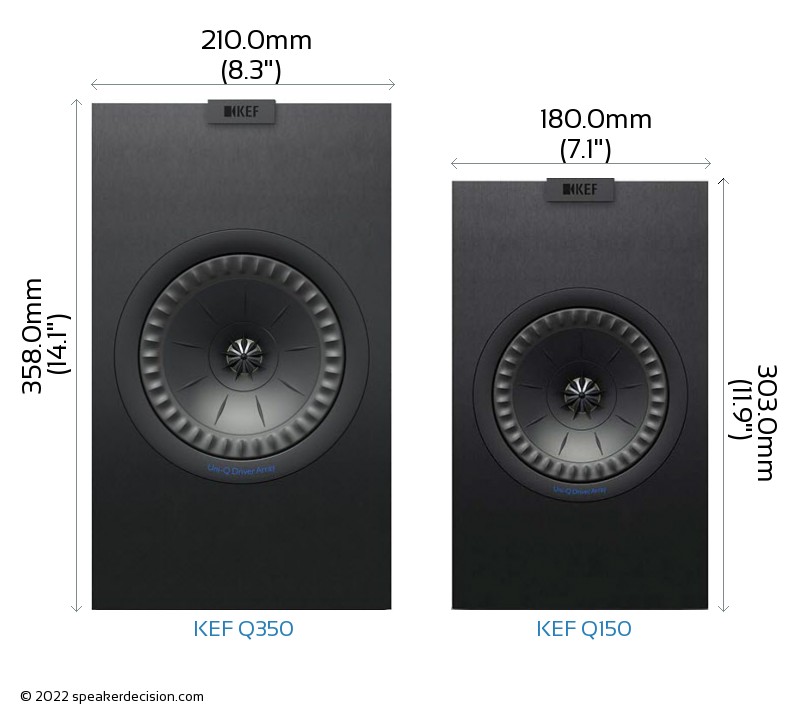 Comparison image of KEF Q350 and KEF Q150 Size and External Dimensions
Comparison image of KEF Q350 and KEF Q150 Size and External Dimensions
Base Surface Area Comparison
Base surface area of a loudspeaker may become a determining factor when the space in your room or desk is limited.
The base surface area of the KEF Q350 is approximately 642.6cm2 / 99.6inch2 and base area of the KEF Q150 is approximately 500.4cm2 / 77.6inch2. The Q350 requires 28% more surface area than the Q150 which gives it a small disadvantage on placement in tight spaces.
Here is an another comparison that shows both speakers on a BDI Octave Media Cabinet, next to a standard size amplifier and turntable in scale:
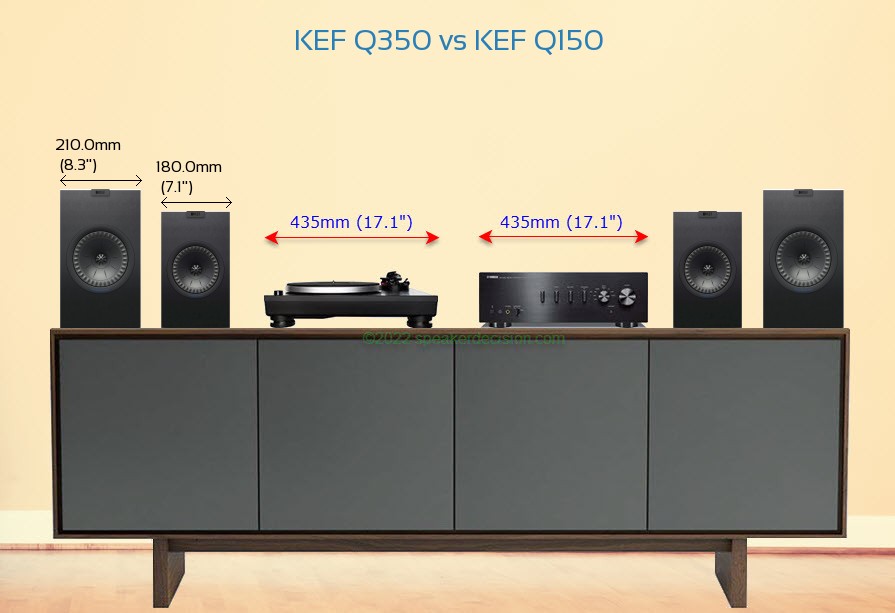 Size Comparison image of KEF Q350 and KEF Q150 on a Media Console
Size Comparison image of KEF Q350 and KEF Q150 on a Media Console
Weight Comparison The weight of a loudspeaker can become an important factor if you need to move and reposition the unit often. Weight of a speaker can also "sometimes" be an indicator of the rigidity of the enclosure and the quality of the internal components used. The KEF Q350 weighs 7.60kg / 16.7lbs and the KEF Q150 weighs 5.60kg / 12.3lbs. This makes the Q350 36% heavier than the Q150.
Here is a comparison of how Q350 and Q150's weights compare with the average, max and min weights in Passive Bookshelf class.
Weight
All Bookshelf Speakers
What's in the Box of KEF Q350?
Here are the items that are included inside the box of Q350:
2 Bookshelf loudspeakers 2 Foam port plugs 8 Self-adhesive rubber feet Owner's Manual Warranty Registration Card
What's in the Box of KEF Q150?
Here are the items that come with the Q150:
2 Bookshelf loudspeakers 2 Foam port plugs 8 Self-adhesive rubber feet Owner's Manual Warranty Registration Card
 Max Input Power Max Input Power |
120 watts
vs
100 watts
|
Handle more power from your amplifier |
 Sensitivity Sensitivity |
87 dB
vs
86 dB
|
Play louder with same amount of amplification power |
 Woofer Size Woofer Size |
6.5 inches
vs
5.25 inches
|
Larger woofer |
 Low Frequency Response Low Frequency Response |
51 Hz
vs
63 Hz
|
Generates deeper bass |
 Height Height |
303mm
vs
358mm
|
Easier to fit in smaller spaces |
 Base Surface Area Base Surface Area |
500cm2
vs
642cm2
|
Takes less floor space |
 Price per pair* Price per pair* |
600USD
vs
750USD
|
costs less (*prices may change depending on the seller, location and time) |
| General |
KEF Q350 |
KEF Q150 |
| Brand |
KEF |
KEF |
| Speaker Type |
Bookshelf speakers |
Bookshelf speakers |
| Power Range |
10-120 watts |
10-100 watts |
| Sensitivity |
87 dB |
86 dB |
| Impedance |
8 ohms |
8 ohms |
| Impedance |
3.7 ohms |
3.7 ohms |
| Frequency Response |
63-28k Hz |
51-28k Hz |
Drivers |
|
|
| Woofer Quantity |
1 |
1 |
| Woofer Size |
6.5" |
5.25" |
| Woofer Composition |
Aluminum |
Aluminum |
| Woofer Surround Material |
Rubber |
Rubber |
| Tweeter Size |
1" |
1" |
| Tweeter Type |
Dome |
Dome |
| Aimable Tweeter |
No |
No |
| Midrange Driver |
No |
No |
| Crossover Frequency |
2500Hz |
2500Hz |
| Firing Direction |
rear |
rear |
Physical Specs |
|
|
| Height |
358.0mm (14.1") |
303.0mm (11.9") |
| Width |
210.0mm (8.3") |
180.0mm (7.1") |
| Depth |
306.0mm (12") |
278.0mm (10.9") |
| Weight |
7.60kg (16.7lbs) |
5.60kg (12.3lbs) |
| Enclosure |
Bass Reflex |
Bass Reflex |
| Finish |
MDF/Vinyl-wrapped |
MDF/Vinyl-wrapped |
| Available Colors |
Black, Walnut, White |
Black, Walnut, White |
| Mounting Bracket |
No |
No |
| Recommended Stand Height |
18-24" |
18-24" |
| Grille |
Yes |
Yes |
| Moisture Resistancy |
No |
No |
Connections |
|
|
| Biamp Inputs |
No |
No |
Other |
|
|
| Parts Warranty |
5 Years |
5 Years |
| Labor Warranty |
5 Years |
5 Years |